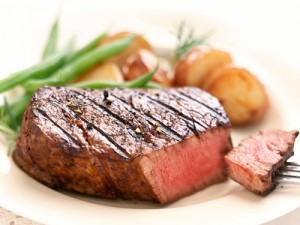So do you know what your cow ate? I'm assuming of course that you eat beef.[caption id="attachment_4234" align="aligncenter" width="300"] Beef offers a number of nutritional benefits.Because there are a number of benefits to eating beef such as:* it's a complete protein meaning it has all of the essential amino acids* it's a good source of B vitamins which are important for immune function, the nervous system as well as healthy skin and eyes* it's a good source of iron which is important for oxygen transport in the body* it's a good source of zinc which is required for healthy immune function* it's a good source of magnesium which helps develop strong muscles and bonesAnd with particular types of beef we can get more nutrients such as omega-3s, vitamin E and conjugated linoleic acid (CLA).Other types of beef? You may be thinking 'beef is beef', right? Well not exactly.Growing up we all remember hearing the expression 'you are what you eat'. In the case of beef a more appropriate expression might be 'you are what your food ate'.Because depending of whether a cow ate grass or grain influences the beef that develops within it. Here's the difference.A cow that eats grass will have:* less fat* fewer calories as it has less fat* more omega-3s which we all need more of* more CLA* more vitamin EUsually when we think of beef we think of protein, which is natural. The interesting thing is that the nutritional benefits of beef that is grass fed doesn't have very much to with the protein. Instead this has almost everything to the quantity and quality of fat in the beef.Another interesting thing to note is that many of the nutrients found in beef such as zinc and magnesium can also be found in some vegetables as well. The difference...
